OUR STRATEGY & APPROACH
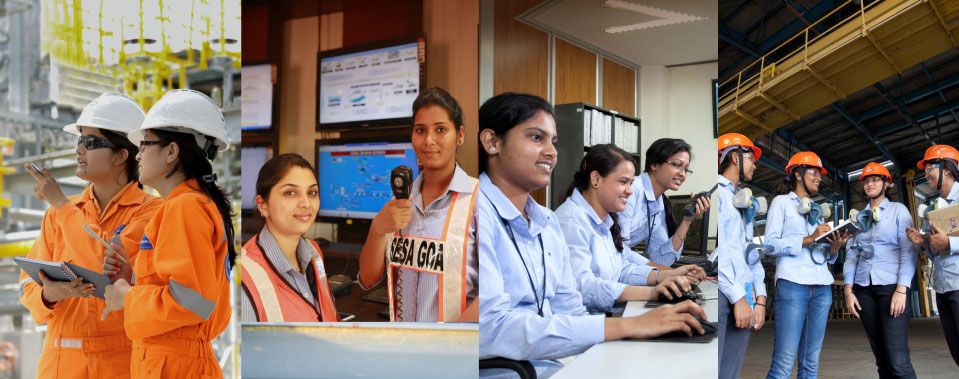

At Vedanta, we understand the value of a unified sustainable development agenda that goes beyond compliance. Though each of our subsidiary businesses operate independently under a federal structure, we follow a Sustainable Development Model which is integral to the core business and the risk management strategy. Developed keeping in mind, multiple internal and external sustainability imperatives like materiality and core values of Vedanta, UNGC's 10 principles, United Nation's SDGs and standards set by International Finance Corporation (IFC), ICMM and OECD
Our Sustainable Development Model comprises four pillars:
Responsible Stewardship
Building Strong Relationships
Adding & Sharing Value
Strategic Communications
These four pillars are critical to ensuring the long-term successful future of our business – meeting our strategic goals of growth, long-term value and sustainability.
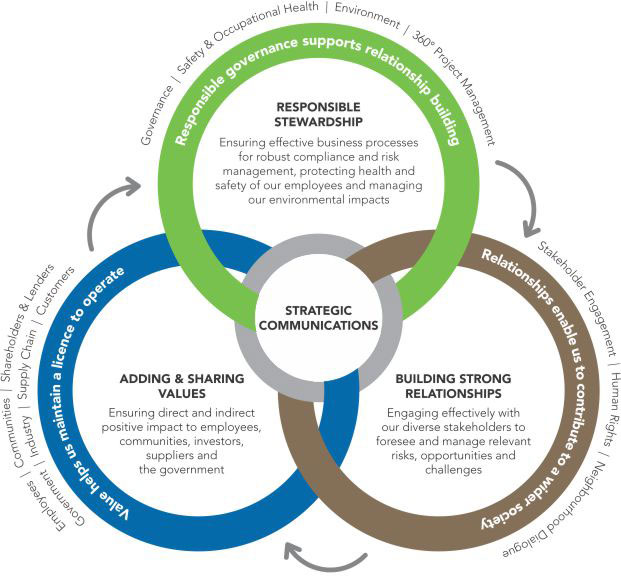
For further details on Sustainable Development Framework, refer to Governance Section
The Sustainable Development Model is reinforced by a Sustainable Development Framework that helps execute the model. The Model and Framework are endorsed by the Board-level Sustainability Committee and provide a robust structure to deliver all-round sustainable performance, and consistency across our business.
MATERIALITY
MATERIALITY ASSESSMENT HELPS US MAINTAIN THE RELEVANCY AND CREDIBILITY OF THE REPORT, AND ENSURES THAT IT REMAINS FOCUSED ON WHAT MATTERS. OUR MATERIALITY PROCESS IS IN LINE WITH GLOBAL REPORTING INITIATIVE (GRI) GUIDANCE. WE SEEK TO IDENTIFY THE ISSUES MOST IMPORTANT TO OUR STAKEHOLDERS AND OUR BUSINESS, AND PRIORITISE OUR INTERVENTIONS ACCORDINGLY.
Two years ago, we conducted a comprehensive Group-wide materiality process comprising identification of material sustainability topics, prioritisation of these topics and verification of our analysis.
To understand the perspective of external stakeholders, we continue to engage with our six core stakeholder groups: Shareholders and Lenders, Industry (suppliers, customers and peers), Civil Society (NGOs and other organisations), Governments, Employees and Communities on a continuing basis. We also conduct a detailed ranking exercise to understand the importance given to certain material issues by the stakeholders. To get the management's perspective, we conduct internal leadership and operational management workshops, interviews and ranking exercises.
Material Aspects
The responses from the ranking exercises are sieved through two measures: 'Relevance to Vedanta's Stakeholders' and 'Relevance to Vedanta Management'; and what emerges is a materiality matrix that is an eclectic mix of sustainability issues that is relevant to us and our stakeholders. This year we have revalidated this materiality matrix.
MATERIALITY MATRIX
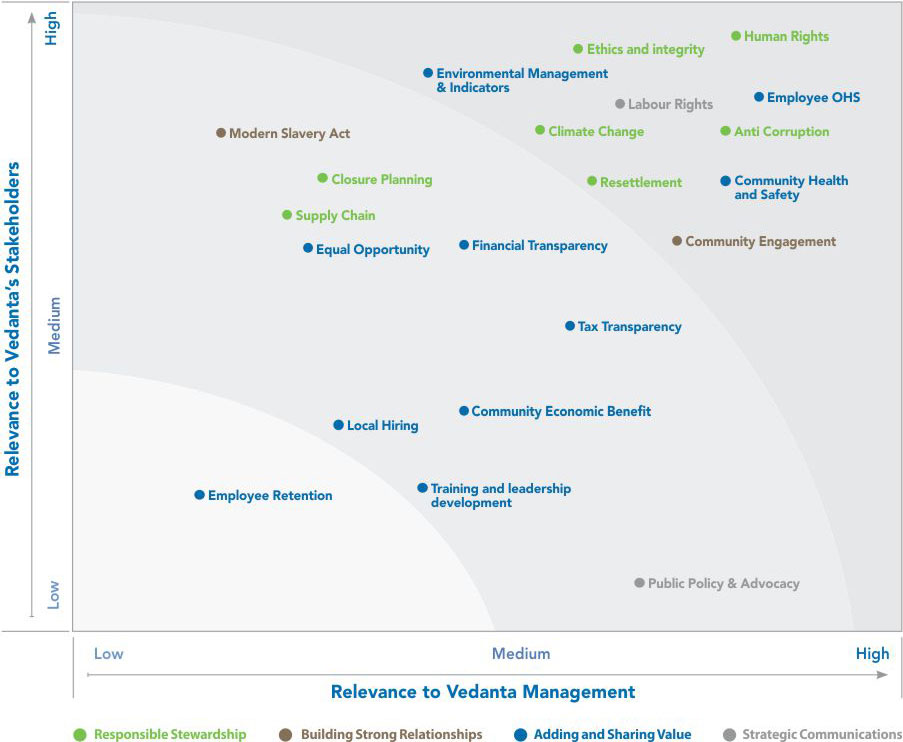
This materiality matrix is reviewed and ratified by both the Executive Committee (EXCO) and the Sustainability Committee. The top-right corner indicates the highest priority issues, indicating the importance for both, the stakeholders as well as the management.
SUSTAINABLE DEVELOPMENT JOURNEY
Our sustainable development journey continues to break new grounds and unlock immense value for us and our stakeholders. We have invested our time and resources in introspecting our actions; we have achieved our targets and formulated ambitious new ones; we have adopted global best practices and taken innovative leaps; we have aligned our standards with industry benchmarks and charted some of our own. We have done all this and continue to do it with a singular agenda: ensuring long-term growth for all stakeholders.
|
FY 2013-14
|
FY 2014-15
|
FY 2015-16
|
FY 2016-17
|
|
Businesses started embedding Vedanta Sustainable Development Framework
training and implementation of policies and standards
External Review Concluded (URS - Scott Wilson)
all recommendations got successfully closed
Sustainability linked with Remuneration sustainable development KPIs linked to executive remuneration
Vedanta Sustainability Assurance Programme (VSAP) into its Second Year of Implementation
supported by external auditors
|
Introducing 'Strategic Communications' as a new pillar of our Sustainable Development Model
Rolling out of Vedanta Sustainable Development Framework continues
Introduction of safety performance standards, formal safety risk assessment, industrial hygiene baseline assessment and safety leadership coaching
VSAP into its Third Year of Implementation revised
as per the material priorities, supported by external auditors
Environment & Social Review of VSAP Started external review
Revisiting our Community Need Assessment Studies
aligning all community projects with updated studies
|
Environment & Social Review of VSAP Continued external review
VSAP into its Fourth Year of Implementation revised as per the material priorities with more emphasis and focus on safety by inclusion of safety performance standards, supported by external auditors
Advancing Accountability
by incorporating safety performance standards into executive remuneration
Social Impact Assessment Studies - HZL & Cairn India
aligning all community projects with updated studies
|
VSAP and its Implementation
VSAP material priorities identified for FY 2016-17
are occupational health and safety, resource use and management, stakeholder engagement, and supplier and contract management
Social Impact Assessment Studies need-based assessment completed for nearly all our businesses.
The major social impact assessment studies were done at Cairn
Advancing Accountability
employee health, safety and well-being identified as the material issue, is a key priority for the company. Hence, it is addressed by incorporating safety performance standards into executive remuneration
|
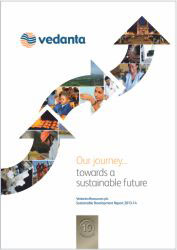
|
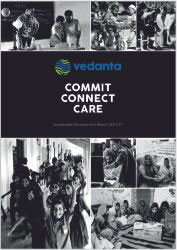
|
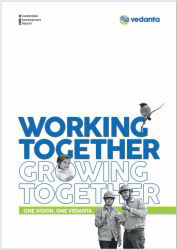
|
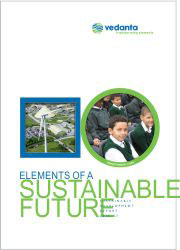
|
ROADMAP & PROGRESS
OUR ROADMAP SETS CHALLENGING ANNUAL TARGETS ON ISSUES MATERIAL TO US AND OUR STAKEHOLDERS, AND IS REVIEWED EVERY YEAR WITH A VIEW TO UNDERSTAND OUR TRIPLE BOTTOMLINE PERFORMANCE. THE GAPS IDENTIFIED ARE ADDRESSED APPROPRIATELY THROUGH ALTERATIONS IN BOTH OUR TARGETS AND ACTIONS. THE ROADMAP CONTINUES TO STEER OUR SUSTAINABLE DEVELOPMENT JOURNEY. THE OBJECTIVES AND TARGETS ARE MAPPED IN ALIGNMENT WITH THE MATERIALITY ISSUES AND THE SUSTAINABLE DEVELOPMENT GOALS.
|
Objectives and Targets FY 2016-17
|
Status
|
Performance FY 2016-17
|
Objectives and Targets FY 2017-18
|
| OCCUPATIONAL HEALTH & SAFETY | |||
|
Achieve zero fatal accidents
|

|
Total - seven fatalities occurred in the reporting year (Iron Ore business - 1, KCM Zambia - 2, HZL - 4)
|
Zero fatal incidents and 22% reduction in Loss Time Injury Frequency Rate (LTIFR)
|
|
Implement safety performance standards: >75% of critical elements in the standards to be implemented across the business
|

|
Average score was 52%. Zinc India, Zinc International and Aluminium Iron Ore were audited and recorded improvement compared to the previous year
|
Achieve score >75% in six safety performance standards
|
|
Performing baseline assessments for two other businesses
|

|
Expanded the baseline exercise at Jharsuguda in March 2017. Also, looking to increase the speed of application in other businesses
|
Extend baseline health assessment across businesses
|
| ENVIRONMENT | |||
|
Water saving: 2.1 million m3
|

|
Water saving of 3.93 million m3 at the end of FY 2016-17 achieved
|
|
|
Energy saving: 1.5 million GJ
|

|
We reached energy saving of 0.62 million GJ at the end of FY 2016-17
|
Energy Saving: 1.39 million GJ
|
|
Continue to monitor new projects and site closure as per the sustainability framework
|

|
All projects at Vedanta Limited are being managed as per Vedanta Sustainability Framework
|
Compliance to environment and social management plan for new projects across businesses
|
|
Completion of Biodiversity Management Plans (BMPs)
|

|
We have made considerable progress in this regard. All our operations have BMPs except few operations in KCM business, Oil and Gas business and Karnataka iron ore business |
Complete BMP at our oil & gas business
|
|
To continue exploring opportunities and areas to increase the fly ash utilisation rate
|

|
Nearly 50% of fly ash from our operations is recycled. The business continues exploring opportunities to utilise fly ash in cement making, road construction and building material manufacturing
|
Achieve 50% of fly ash utilisation rate
|
|
To realign the Group's energy and carbon policy in line with COP 21 outcomes
|

|
Carbon Forum has been formed. Policy and strategy drafted with baseline targets and actions under development
|
We are considering formal GHG reduction targets and we expect to achieve a 16% reduction in carbon intensity by 2020 from a 2012 baseline, which was the first year of audited data
|
|
Capacity building (selected professionals) on biodiversity management including ecosystem services
|

|
Could not initiate in FY17
|
Initiate the capacity building of selected professionals on biodiversity
|
|
Independent expert to review high priority facilities
|

|
Review completed and those responsible for dam management have been trained. Two facilities undergoing further analysis, but no areas of immediate concerns were found and some best practices identified
|
Complete the dam break analysis of the identified facilities across businesses
|
| COMMUNITY RELATION & STAKEHOLDER ENGAGEMENT | |||
|
Social impact assessment studies to be continued for remaining sites
|

|
Need-based assessment completed for almost all sites. The social impact assessment studies were done at oil & gas business
|
Social impact studies to be continued for remaining sites
|
|
Implementation and utilisation rate of the SAP system to be increased
|

|
SAP - Stakeholder and grievance handling system rolled out
|
-
|
|
-
|
|
-
|
Expand the company's flagship CSR programme, Nand Ghar, to all our businesses
|
|
-
|
|
-
|
Embed and encourage employee volunteering for social initiatives
|
| HUMAN RESOURCES | |||
|
Focus on performance and measurement for top 150 leaders
|

|
Scope and contract finalised. Scorecard of 700 professionals in place including top 150 leaders. Initiative being driven in project mode
|
Employee scorecard coverage to be extended to 100% of the professional employees
|
|
Ensuring 100% coverage of Code of Conduct training for all employees
|

|
100% employees could not be covered under code of conduct training
|
Ensure 100% coverage of code of conduct training for all new professional employees
|
|
Continue to focus on the diversity objective of 15% of new hires to be women
|

|
18% of employees joining this year were women
|
Focus will be to increase gender diversity in hiring 20% women this financial year
|
|
33% female representation at the Vedanta Board Level by 2020
|

|
We are moving forward to achieve the target. During the reporting year, we have made a number of senior female appointments
|
Target to achieve 33% female representation at the Vedanta Board Level by 2020
|
 Achived Achived  In Progress / Partially achieved In Progress / Partially achieved  Not achieved Not achieved |
|||

